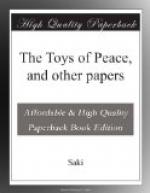Rhoda welcomed him into a room that seemed to do duty as workshop, sitting-room, and kitchen combined, and to be wonderfully clean and comfortable at the same time.
“I’m having a picnic meal,” she announced. “There’s caviare in that jar at your elbow. Begin on that brown bread-and-butter while I cut some more. Find yourself a cup; the teapot is behind you. Now tell me about hundreds of things.”
She made no other allusion to food, but talked amusingly and made her visitor talk amusingly too. At the same time she cut the bread-and-butter with a masterly skill and produced red pepper and sliced lemon, where so many women would merely have produced reasons and regrets for not having any. Cushat-Prinkly found that he was enjoying an excellent tea without having to answer as many questions about it as a Minister for Agriculture might be called on to reply to during an outbreak of cattle plague.
“And now tell me why you have come to see me,” said Rhoda suddenly. “You arouse not merely my curiosity but my business instincts. I hope you’ve come about hats. I heard that you had come into a legacy the other day, and, of course, it struck me that it would be a beautiful and desirable thing for you to celebrate the event by buying brilliantly expensive hats for all your sisters. They may not have said anything about it, but I feel sure the same idea has occurred to them. Of course, with Goodwood on us, I am rather rushed just now, but in my business we’re accustomed to that; we live in a series of rushes—like the infant Moses.”




